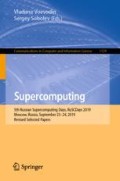Abstract
We describe an approach to teaching Machine Learning and High-Performance Computing classes for Master students at Ural Federal University. In addition to the theoretical classes, the students participate in the projects in collaboration with the partner companies and research laboratories of the university and institutes of the Russian Academy of Sciences. The partners provide not only project topics, but also the experienced mentors to assist the students in project work. We discuss the structure of the Project Workshop class that was designed to include the project-based learning into the curriculum. As a result, during the Master studies, the students not only learn the theoretical basis but also gain experience solving real-world problems, which has a positive effect on employment.
Access this chapter
Tax calculation will be finalised at checkout
Purchases are for personal use only
References
Hicks, S.C., Irizarry, R.A.: A guide to teaching data science. Am. Stat. 72(4), 382–391 (2018). https://doi.org/10.1080/00031305.2017.1356747
Song, I.Y., Zhu, Y.: Big data and data science: what should we teach? Expert Syst. 33, 364–373 (2016). https://doi.org/10.1111/exsy.12130
Sababha, B., Alqudah, Y., Abualbasal, A., AlQaralleh, E.: Project-based learning to enhance teaching embedded systems. Eurasia J. Math. Sci. Technol. Educ. 12(9), 2575–2585 (2016). https://doi.org/10.12973/eurasia.2016.1267a
Russell, I., Markov, Z., Neller, T.: Teaching AI through machine learning projects. SIGCSE Bull. 38(3), 323–323 (2006). https://doi.org/10.1145/1140123.1140230
Kuppers, B., Dondorf, T., Willemsen, B., et al.: The scientific programming integrated degree program - a pioneering approach to join theory and practice. Procedia Comput. Sci. 80, 1957–1967 (2016). https://doi.org/10.1016/j.procs.2016.05.516
Borodin, A., Mirvoda, S., Porshnev, S., Bakhterev, M.: Improving penalty function of R-tree over generalized index search tree possible way to advance performance of PostgreSQL cube extension. In: IEEE 2nd International Conference on Big Data Analysis (ICBDA), pp. 130–133 (2017). https://doi.org/10.1109/ICBDA.2017.8078791
Rubinchik, M., Shur, A.M.: EERTREE: an efficient data structure for processing palindromes in strings. In: Lipták, Z., Smyth, W.F. (eds.) IWOCA 2015. LNCS, vol. 9538, pp. 321–333. Springer, Cham (2016). https://doi.org/10.1007/978-3-319-29516-9_27
Kumkov, S.S., Le Ménec, S., Patsko, V.S.: Zero-sum pursuit-evasion differential games with many objects: survey of publications. Dyn. Games Appl. 7(4), 609–633 (2016). https://doi.org/10.1007/s13235-016-0209-z
Prokhorenkova, L., Gusev, G., Vorobev, A., et al.: Catboost: unbiased boosting with categorical features. In: Advances in Neural Information Processing Systems, pp. 6638–6648 (2018)
Korobov, M.: Morphological analyzer and generator for Russian and Ukrainian languages. In: Khachay, M.Y., Konstantinova, N., Panchenko, A., Ignatov, D.I., Labunets, V.G. (eds.) AIST 2015. CCIS, vol. 542, pp. 320–332. Springer, Cham (2015). https://doi.org/10.1007/978-3-319-26123-2_31
Pedregosa, F., Varoquaux, G., Gramfort, A., et al.: Scikit-learn: machine learning in python. J. Mach. Learn. Res. 12, 2825–2830 (2011)
Government Procurement System of Russian Federation (in Russian). http://www.zakupki.gov.ru
Prediction of the Government Procurement Results (in Russian). https://github.com/zakoopkee/zakupki
Sotnikov, O.M., Mazurenko, V.V., Iakovlev, I.A.: Supervised learning approach for recognizing magnetic skyrmion phases. Phys. Rev. B 98(17), 174411 (2018). https://doi.org/10.1103/PhysRevB.98.174411
Hill, J., Mulholland, G., Persson, K., Seshadri, R., Wolverton, C., Meredig, B.: Materials science with large-scale data and informatics: unlocking new opportunities. MRS Bull. 41(5), 399–409 (2016). https://doi.org/10.1557/mrs.2016.93
Author information
Authors and Affiliations
Corresponding author
Editor information
Editors and Affiliations
Rights and permissions
Copyright information
© 2019 Springer Nature Switzerland AG
About this paper
Cite this paper
Sozykin, A., Koshelev, A., Ustalov, D. (2019). The Role of Student Projects in Teaching Machine Learning and High Performance Computing. In: Voevodin, V., Sobolev, S. (eds) Supercomputing. RuSCDays 2019. Communications in Computer and Information Science, vol 1129. Springer, Cham. https://doi.org/10.1007/978-3-030-36592-9_53
Download citation
DOI: https://doi.org/10.1007/978-3-030-36592-9_53
Published:
Publisher Name: Springer, Cham
Print ISBN: 978-3-030-36591-2
Online ISBN: 978-3-030-36592-9
eBook Packages: Computer ScienceComputer Science (R0)

